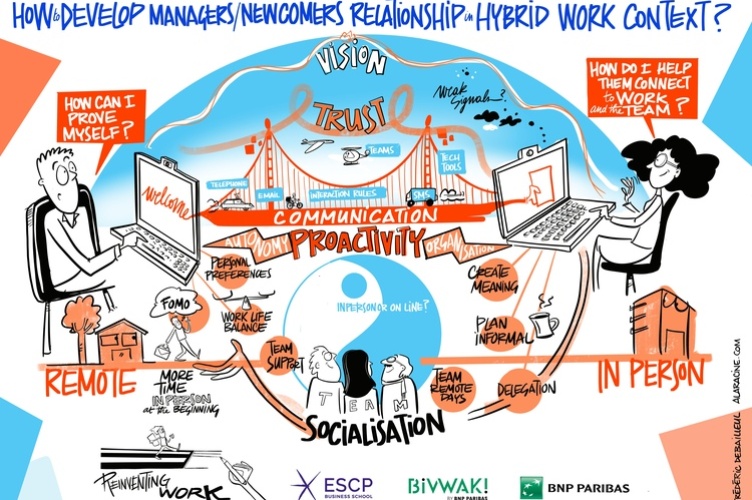Onboarding practices: developing managerial relationships in a hybrid environment A fascinating project launched in December 2023
Research context
This project has been designed to address the challenges of adapting to hybrid work conditions.
Hybrid work, in particular, adds complexity to the integration and socialization of new hires, posing significant challenges for managerial practices that must adapt to this evolving context. These challenges raise critical concerns regarding employee engagement and retention. This research aims to highlight the best practices for onboarding practices and for developing positive and efficient manager employee relationships.
Research question
How does hybrid work affect the development of employee-manager relationships and how can onboarding practices foster the quality of this relationship?
Methodology and milestones
This research uses a mixed-methods approach:
- Quantitative: Online questionnaires, administered to up to 500 newcomers (in English or French) four times within their first year, aim to understand how employee-manager relationships develop during this period and their long-term impact. Managers also provide matching perspectives.
- Qualitative: Interviews with ~40 managers and newcomers explore how hybrid contexts affect relationships and onboarding practices.
Data collection started in December 2023 and will conclude by June 2026. Quantitative results are expected in Q4 2026. Manager interviews are complete, and newcomer interviews will occur in early 2025, with feedback expected mid-2025.
Research team
- Marie-Colombe Afota (Université de Montréal)
- Véronique Robert (Toulouse School of Management)
- Pedro Gonzalo (Toulouse School of Management)
- Emmanuelle Léon (ESCP, Paris campus)
Research keytake aways
- Hybrid work has fundamentally transformed onboarding and relationship dynamics within teams. Managers now view onboarding as a collective effort, involving the entire team rather than being solely their responsibility. This shift, however, often slows down the process of building strong relationships, as hybrid settings prioritize task completion over individual connections. Remote interactions, in particular, tend to be more instrumental and work-focused, making it harder to detect subtle signals or address personal needs. In-person time, while valuable for informal and spontaneous exchanges, requires intentional planning to fully leverage its benefits.
- Another key challenge of hybrid work lies in monitoring the integration and performance of newcomers. Managers find it harder to assess the quality of relationships and work outcomes, as hybrid settings lack immediate visibility. This requires relying on diverse sources of information, such as input from peers, team members, or data provided by technological tools.
- The use of communication tools and the introduction of newcomers to the company’s culture demand special attention. Newcomers often lack an understanding of organizational dynamics, such as power relations and interaction norms. Managers must dedicate additional time to educate them, ensuring they feel integrated and aligned with the company's way of working.
Key outcomes
Published academic papers
■ Submission of abstracts to different European conferences in 2025: “XXIIIrd International Congress of Work Psychology” (July 2025), XXIInd Europena Congress of Work and Organizational Psychology
Campuses
